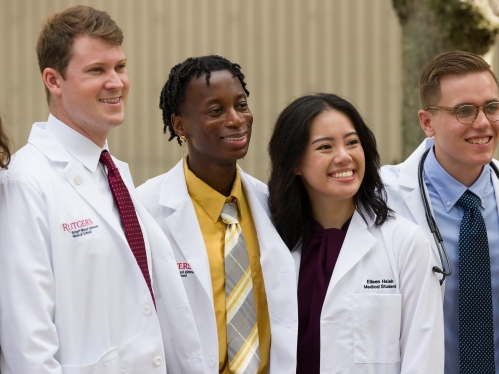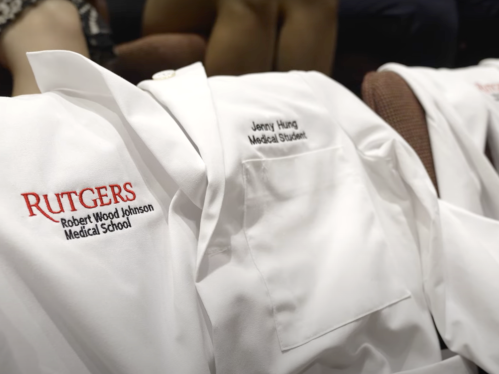Rheumatology Fellowship
GOALS/MISSION
The purpose of our rheumatology training program is to 1) train fellows to be accomplished practitioners and consultants in the rheumatic diseases, and 2) encourage the professional and scholarly attitudes and approaches of a competent subspecialist that are needed to maintain an understanding of current concepts in rheumatology as advances occur. 3) Life-long learner.
Clinical training: Our fellows are guided in the clinical science of rheumatology at Robert Wood Johnson University Hospital, the teaching hospital of Rutgers Robert Wood Johnson Medical School (Rutgers RWJMS), New Brunswick, New Jersey. Clinical training spans two years, during which time fellows participate in the diagnosis and management of patients with a wide variety of rheumatic diseases and other diseases with rheumatologic manifestations. Fellows become part of a team of residents and students headed by full-time faculty who supervise the practical aspects of patient care and provide didactic teaching in the scientific disciplines that underlie the clinical practice of rheumatology.
EDUCATION
The fellowship program curriculum provides the opportunity for trainees to achieve cognitive knowledge and procedural skills, develop interpersonal skills, professionalism, cultivate humanistic attitudes, ethical behaviors and gain supervised practical experience as a consultant in treating a wide range of clinical problems- acute and chronic- in varied patient populations (different ethnicities, age groups, socioeconomic and cultural backgrounds).
The Scleroderma Program at Rutgers offer unique experiences for our trainees to learn state-of-the-art management and provide excellent research opportunities focused on these diseases.
Fellows have ready access to specialty-specific and other appropriate reference material in print or electronic format through the Rutgers University Libraries. Electronic medical literature databases with search capabilities are be available from any location.
RESEARCH
An active research component will be included within the fellowship training program. A meaningfully research experience must be provided with appropriate protected time for each fellow. The fellow will select a mentor and develop a specific research project. During the second year of training there will be time reserved for research with the expectation that an abstract will be submitted to the next American College of Rheumatology national meeting and a publication will result. The research should develop a research question, study design, lead to the collection and evaluation of data and the report of the conclusion.
RECENT CHANGES
2 new faculty will join the Rheumatology Division in fall 2020 to strengthen the academic and clinical success of the division, and give the fellowship training an excellent educational and learning experience. The trainees are expected to work with RWJ faculty who perform ultrasound using state-of-the art equipment in the outpatient clinics
Educational Curriculum
-
Basics of ACGME Requirements:
Patient Care
The essence of being a rheumatologist is the ability to use information derived about a patient (history, physical examination, laboratory and imaging studies) along with medical knowledge to orderly synthesize a differential diagnosis, plan of further evaluation and comprehensive management for the patient being evaluated for rheumatic disease or rheumatic disease manifestations.
Medical Knowledge
The scholarly assimilation of established and evolving biomedical, clinical, and cognate sciences, and the application of this knowledge to patient care. Our program will provide physicians with a solid foundation in the basic and clinical science of rheumatology so they can demonstrate medical knowledge about established and evolving biomedical, clinical and cognate (e.g. epidemiological and social-behavioral) sciences and apply this knowledge to patient care and performance of research in the rheumatic diseases. Our rheumatology trainees will be taught state-of-the-art management of the rheumatic diseases and develop an understanding of the approaches and modalities used by other specialists and health professionals in managing the same diagnoses.
Professionalism
One of the foundations of the practice of medicine. By virtue of their prior medical school education and internal medicine training, rheumatology trainees have already attained a substantial level of professionalism, which can be further enriched during the fellowship training period. Traits of professionalism are also modeled by the multiple daily interactions of the trainees at all stages of training with senior rheumatology faculty physicians. Our educational goals throughout the training are to continuously emphasize the requirement that the trainee act in the best interest of the patient, while displaying the appropriate sensitivity to patient and accepting responsibility for patient care
Practice-based Learning and Improvement
Our rheumatology trainees will have a lifelong commitment to practice-based learning and improvement so that they investigate, evaluate and improve their patient care practices, appraise and assimilate scientific evidence, possess the skills to competently educate medical students /physicians /other health care professionals about rheumatic diseases and improve their research practices in rheumatology.
Interpersonal and Communication Skills
Communication skills are essential for the formation of a desirable and effective physician patient relationship. The complexity of most of the rheumatic diseases, as well as the increasingly complicated treatment regimens, require a working partnership between patient and physician, and often between both physician and the patient’s family or caregiver(s), as well as physician and members of an inter-professional team of providers. In addition to improved patient satisfaction, confidence and understanding, such working partnerships promote medical compliance.
Systems-based Practice
Systems-based practice (cost effective healthcare) reflects an understanding of and responsiveness to the larger context and system of health care, as well as the ability to call effectively on other resources in the system to provide optimal health care. The increasing complexity and diversity of health care delivery systems presents both challenges and opportunities for the practice of rheumatology. The goal of the systems-based practice curriculum is to enhance the ability of our rheumatology trainees to positively influence patient care by effectively utilizing these internal and external resources, to serve as effective advocates for their patients, and to provide cost-effective patient care. In some cases this may also mean identifying and organizing changes in the local systems’ problems that can improve patient care.
-
Rotations
Outpatient clinics include a weekly scleroderma clinic and 2-3 additional general rheumatology clinics. Each trainee would be responsible for four to eight patients during the four-hour clinic session.
Rheumatology provides consultation service to RWJUH only. Inpatient consultations usually range from three to ten new consults per week. Each trainee will take call in 2 week blocks. The rheumatology trainee, under direct mentorship and supervision of the rheumatology faculty attending, is responsible for the total management of the inpatients.
The trainees spend up to 12 weeks on outside rotations as follows: University Orthopedics (hand, spine and trauma clinics), Pediatric Rheumatology, Bone Radiology, Physical Medicine and Rehabilitation.
-
- Didactic Conferences are held on a regular basis and all fellows participate actively in the planning and participation of these conferences. Conferences are held on a regularly scheduled basis with attendance required of all fellows and divisional faculty. There is a weekly conference that includes a monthly research conference, a quarterly PT/OT multidisciplinary conference, a monthly fellow presentation and other clinical presentations. There will be a monthly journal club. Other conferences include (but not limited to) the following:
- RWJ Medical School Grand Rounds- all trainees are expected to attend weekly
- RWJ lectures focused on the art, business and ethics of medicine (quarterly) are mandatory for all trainees.
- Annual NJ Rheumatology Association meeting with CME lectures
- Annual American College of Rheumatology /SOTA meetings
- Rheumatology Board Review course offered to graduating trainee
- University of Pennsylvania first year fellows conference
-
EXPERIENCE
The trainee will learn to use evidence based medicine principles and perform critical review of the literature. The immediate goal of the research experience is for the fellow to learn sound methodology in designing and performing research studies and the correct interpretation and synthesis of research data. During this phase of training the fellow will work under close guidance of the research mentor. All trainees conducting research will be CITI trained and guided by research ethics.
OPPORTUNITIES
Every fellow is expected to identify a mentor and project(s), and initiate meetings with potential mentors and others participating in their research. Fellows then meet regularly with their research mentor through the course of their study. Every fellow is also expected to complete at least one quality improvement project over the course of their fellowship. If they choose, they may lead this project with a team including but not limited to medicine residents and students. Their quality improvement project should be conceptualized by the end of first year. Updates on this project will need to be provided during each semi-annual Program Director evaluation.
Fellows are also expected to submit research to one or more rheumatology conferences each year. As a first author, they will present this research at the conferences. While attending these conferences, they will participate in other scheduled lectures, courses and conferences, and present this updated research during didactic sessions. Fellows may also choose to participate in other research activities including writing book chapters, manuscript reviews and invited research submissions
SAMPLES OF RECENT PUBLICATIONS BY FELLOWS WITH FACULTY
[1] Pai S, Schlesinger N. Some safety concerns for drugs for acute and chronic gout. Drug Safety Quarterly – an online publication of the ACR drug safety committee 2014; 5(2): 1-4.
[2] Pai S, Raslan A, Schlesinger N. Gout: Update on current therapeutics. Current Treatment Options in Rheumatology 2015; 1 (2):131-142.
[3] Keenan R, Pai S, Schlesinger N. Epidemiology of gout 383. Oxford Textbook of Osteoarthritis and Crystal Arthropathy 2016; (Chapter 44)
[4] Bhatt V, Stermer C, Hsu V, Sharma R.: Oropharyngeal Dysphagia: Rare presentating symptoms of Statin-induced HMG Co-A Reductase Necrotizing Autoimmnune Myopathy. Rheumatology: Current Research 2017; 7(4): 1-2. DOI: 10.4172/2161-1149.1000229
[5] Pai, S. and Hsu, V., Are there risk factors for scleroderma-related calcinosis?. Modern Rheumatology 2018; 28(3), pp.518-522.
[6] Zuckerman R, Damiani L, Ayyad HA, Alpert D.: Persistent cervical lymphadenitis in a patient with prior thyroid cancer attributed to Kikuchi-Fujimoto disease. British Medical Journal Case Reports. 2018; PMID: 30344150
[7] Sidor M, Zuckerman R, Schlesinger N, Sussman R, Sabahath H, Hsu V. Ultrasound Measurement of the Nail Bed Matrix Thickness as a Useful Marker for Scleroderma-Related Interstitial Lung Disease [abstract]. Arthritis Rheumatol. 2019; 71 (suppl 10).
-
- Completion and passing of all three USMLE step
- ABIM board certified or board eligible
- The accepted applicant must obtain a full NJ license (limited license if on visa)
- A valid ECFMG certificate for all foreign medical graduates
- Completion of a prior internal medicine residency is required
-
Jyoti Verma, MD
Fellowship Year 1
Medical School: Lady Hardinge Medical College
Residency: Saint Peter’s University HospitalPooja Jotwani, MD
Fellowship Year 2
Medical School: B.J. Medical School
Residency: Crozer-Chester Medical Center
Salaries and Benefits
The Rheumatology Fellowship offers a uniform package of benefits consistent with those provided at all graduate medical educational programs operated by the medical school. Full details are continuously updated by the Office of Graduate Medical Education.

Contact Us
Ms. Alicia Marty
Fellowship Program Coordinator
alicia.marty@rwjms.rutgers.edu.

